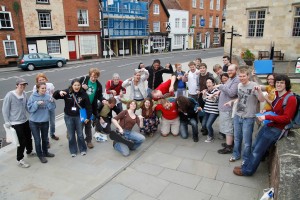AHS – Gateway to the World?
Last Tuesday, I delivered a lecture to the Leeds Atheist Society on how getting involved with your local student society is more than just a social opportunity with a few interesting talks thrown in. In order to really get the most out of the experience, I suggested that members should look to involve themselves early and then progress through to the wider community – i.e, AHS, BHA etc.
The theme of my lecture was on what the AHS and the BHA have to offer to students and how the local atheist, humanist or secularist student society offers a real platform from which to really explore those opportunities.
The AHS offers a fantastic range of ways of building experience and developing the CV. From the Regional Development Officers who gain invaluabvle experience of networking, communication and team working through to the Executive with their exposure to leadership, risk management, strategic planning and public relations there are saleable skills there for the taking.
Being a part of any organisations, particularly on a voluntary basis, is not easy and requires a time and resource commitment. However, it is my experience that this is well worth the effort. Unluike traditional internships and work experience, there is real flexibility in how the time and resources are delivered and as the leadership stems from the internship style positions, rather than managed from a permanent employee, then individuals can mould their experience to fit their needs.
Having gone from being a member of a society, through to leading that society and then going on to found and lead the AHS as president, I have had the chance to see what those opportunities look like. I met Richard Dawkins, negotiated affiliations with national charities, led a local campaign to ban Halal and Kosher meat, debated professional speakers and made some long lasting friendships with people from across the UK and Republic of Ireland.
It is my opinion that organisations like the AHS offer far more value than they are given credit for and if any students are reading this, then they should strongly consider looking to get involved.



